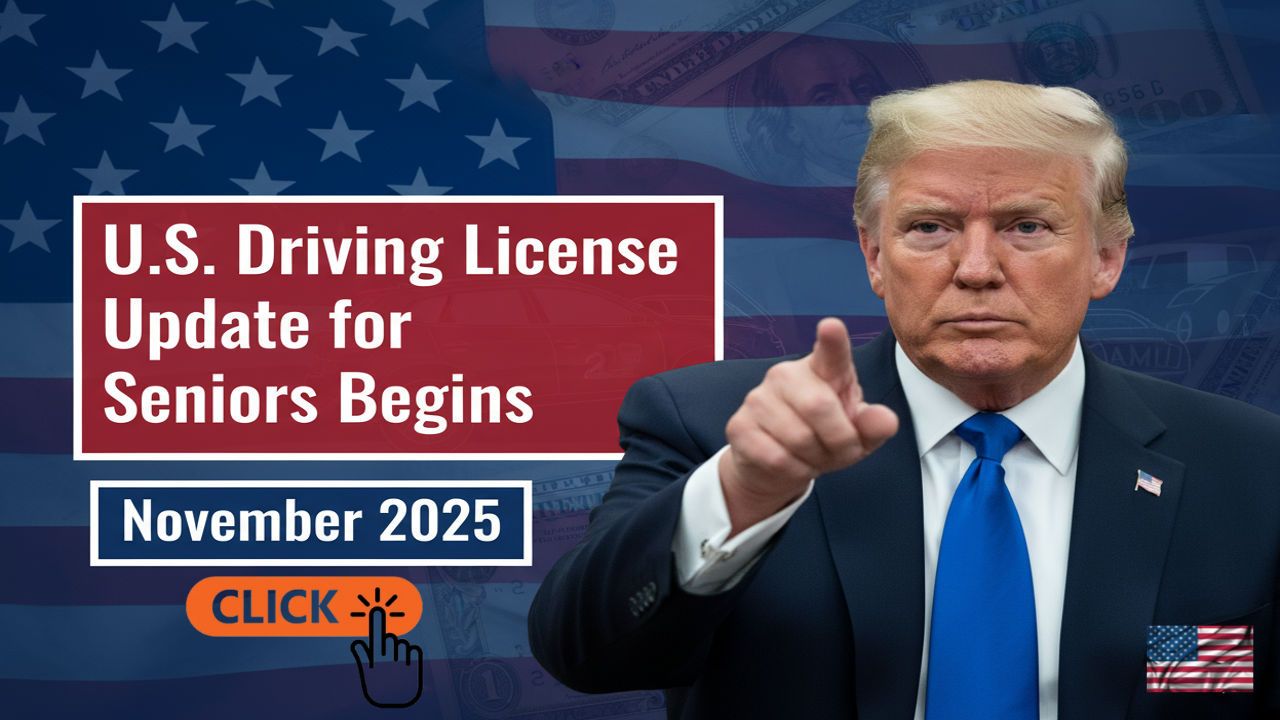Beginning in late 2025, senior driver renewals across the United States are being updated under a safety-first framework that emphasizes ability over age. The model pairs periodic screenings with practical options like refresher courses and, where appropriate, restricted licenses. While licensing remains a state responsibility, most DMVs are aligning to a common set of expectations for drivers age 70 and older. This article explains what to expect at renewal, how states differ, what happens if you do not pass a screening on the first try, and which mobility alternatives are expanding so you can stay independent.
U.S. Driving License Update for Seniors Begins November 2025 Quick Summary
Item |
Details |
|---|---|
Who is affected |
Licensed drivers age 70+ at renewal |
Core requirements |
Vision exam, reaction-time/cognitive screening, and a short refresher/knowledge component at renewal intervals |
Philosophy |
Ability, not age; support safe drivers, identify risks early, and tailor conditions where needed |
Possible outcomes |
Standard renewal, restricted license (e.g., daylight-only, local-area), referral for medical review, or on-road test |
Reporting pathway |
Healthcare professionals, law enforcement, and (in some states) family may submit safety concerns for review |
State variations |
Renewal frequency, exact tests, appeal steps, and restricted-license options vary by state |
What to bring |
Government ID, current license, prescription lenses, medical documentation, proof of residence/insurance as required |
Official site link |
USA.gov Motor Vehicle Services: https://www.usa.gov/motor-vehicle-services |
Why These Changes Now?
The senior population is growing, and so is the number of older licensed drivers. Data trends show that while older drivers are often cautious and compliant, age-related changes vision at dusk, glare sensitivity, slower reaction times, or medication effects can increase crash risk starting in the mid-70s. The 2025 framework aims to keep experienced seniors on the road safely by standardizing minimal checks at renewal and offering graduated options rather than a one-size-fits-all approach.
What Will Happen at Renewal
While specific procedures differ by state, most DMVs now follow a similar outline for people 70 and older:
- Identity and eligibility check
Bring your current drivers license, required proofs of identity and residency, and any documents your DMV lists for renewals. - Vision screening
You will take a vision test. If you use glasses or contacts, bring them. Some states also ask for a recent eye-exam certificate from an optometrist or ophthalmologist. - Reaction-time or cognitive screening
A brief, standardized screening may be administered on a tablet or terminal to assess divided attention, processing speed, and visual fields. This is not a diagnostic exam; it flags whether a further check is advisable. - Refresher component
Many states incorporate a short knowledge review or senior-focused refresher (signs, rules that change often, right-of-way scenarios, work-zone speeds, and safe following distance). In some places this is done online before your appointment. - Outcome and next steps
- Pass: You receive a standard renewal for the full term.
- Borderline: You may be offered a restricted license (e.g., daylight-only, no freeway, local radius) or asked to provide a medical note or complete a focused on-road evaluation.
- Further review needed: You might be referred to a medical advisory board, occupational therapy driving evaluation, or a road test prior to renewal.
Restricted Licenses: Tailored, Not Punitive
A central feature of the 2025 framework is the expanded use of restricted licenses when a drivers limitations are specific and manageable. Typical conditions include:
- Daylight-only or no-night driving
- Local-area radius (e.g., within 25 miles of home)
- No freeway/interstate driving
- Corrective lenses required
- Adaptive equipment required (e.g., wide-angle mirrors)
Restrictions are reviewed at each renewal and can be adjusted or removed if screening or medical documentation supports a change.
The Reporting and Appeals Pathway
Most states now maintain a secure channel to flag safety concerns about a driver primarily for healthcare professionals and law enforcement. Some states also accept submissions from immediate family. A flag does not revoke a license; it triggers a case review that may require medical documentation or a focused road test.
If you disagree with a decision (for example, you are issued a restriction you believe is unnecessary), states provide an appeal or re-examination pathway. This typically includes supplying new medical evidence, completing a licensed clinical driving assessment, or taking an on-road re-test with a senior examiner.
How States Differ (Examples of Common Patterns)
Because DMVs are state-run, expect differences in:
- Renewal frequency for 70+ (often 4–8 years, shorter terms in some states)
- Which screenings are required (vision only vs. vision plus reaction-time)
- Whether remote/telehealth documentation is accepted
- How restricted licenses are defined and issued
- On-road test thresholds and appeal timelines
Your state DMV website will list the exact age trigger, tests, documentation, fees, and appointment process.
How to Prepare: A Practical Checklist
- Book early
Renewal calendars fill quickly. Make an appointment weeks in advance and verify whether your state allows pre-visit online tasks. - Get your eyes checked
Schedule a comprehensive eye exam. Update prescriptions and bring your lenses to the DMV. - Review a senior-focused refresher
Consider an AARP/AAA mature driver course or your state online refresher module. Apart from helping you pass, these often qualify you for auto insurance discounts. - Know your medications
Bring a list. Ask your clinician or pharmacist about side effects such as drowsiness, dizziness, or light sensitivity that could affect driving. - Practice the tough stuff
Dusk and night driving, left turns across traffic, merging onto busy roads, and scanning for pedestrians. If needed, work with a driving rehabilitation specialist. - Bring the right paperwork
Proofs of identity/residency, medical letters if requested, glasses/contacts, and any required forms your DMV lists for age-based renewals. - If flagged for review
Stay calm; a flag is a request for clarity, not a judgment. Complete the requested steps (exam, note, or on-road evaluation) promptly to avoid license lapses.
If You Do Not Pass on the First Try
A non-passing result does not necessarily end your driving. Common pathways include:
- Targeted corrections (updated glasses, cataract surgery scheduling, medication adjustment) followed by a re-test.
- Restricted license while you make changes or complete training.
- Occupational therapy driving evaluation to identify aids or strategies that restore safe performance.
The goal is to support safe mobility, not to remove it unnecessarily.
Alternatives That Preserve Independence
If you prefer to limit or stop driving or you receive a restriction alternatives are expanding:
- Rideshare senior programs (promos, call-in dispatch for non-smartphone users)
- City senior shuttles and paratransit for medical appointments and groceries
- On-demand rural transit pilots funded by federal and state partners
- Community driver networks organized by faith or volunteer groups
Ask your Area Agency on Aging or city transit authority about reduced fares, vouchers, and door-to-door services in your ZIP code.
Common Myths, Debunked
- “There is a national age limit to stop driving.”
False. The framework uses ability checks, not a mandatory retirement age. - “One poor result means I lose my license.”
Not necessarily. Many cases are resolved with corrective steps or an appropriate restriction. - “Only neighbors can report me.”
In most states, healthcare professionals and law enforcement are the primary referral sources; family may submit concerns in some jurisdictions.
FAQs
Q1. Who must complete the new screenings?
All drivers age 70+ at renewal should expect a vision test, a brief reaction-time or cognitive screening, and a refresher/knowledge component, subject to state specifics.
Q2. Is there a fixed age when I must surrender my license?
No. The model is ability-based. Many drivers in their 80s and beyond qualify for full renewals or tailored restrictions that keep them safely mobile.
Q3. Who can report a safety concern?
Typically healthcare professionals and law enforcement; in some states, family members can also submit concerns. Reports trigger a review, not an automatic suspension.
Q4. What happens if I fail a screening?
You may receive a restricted license, be asked for medical documentation, or take a road test. Corrections (updated eyewear, medication adjustments) often resolve issues quickly.
Q5. Can I appeal a restriction or denial?
Yes. States offer appeals or re-examination. You may submit new medical evidence or complete a clinical driving evaluation to support your case.
Q6. Are remote or telehealth documents accepted?
Many states accept provider attestations or eye-exam certificates; policies vary, so check your DMV instructions before your visit.
Q7. What if I choose to stop driving?
Explore rideshare senior discounts, paratransit, on-demand shuttles, and community driver programs. These options can preserve independence without daily driving.
Conclusion
The 2025 senior renewal framework is about keeping safe drivers on the road and identifying risks early not about taking away the keys. Expect a short set of screenings, a focus on practical refresher skills, and flexible outcomes that match your abilities. Preparation makes the difference: update your eyewear, review core rules, bring the right documents, and speak with your clinician about medications. If you do encounter a restriction or review, remember the system is designed to tune up the driver, not to punish age.
For More Information Click Here








